Agriculture and Biosecurity newsletter: September 2024
Message from Andrew Kirkman, Agriculture and Fisheries CEO

As the incoming CEO of the new Department of Agriculture and Fisheries, I wanted to take a moment to say hello.
In the short few weeks I’ve been in the role, I have been greatly impressed by the expertise and passion of people both in the Department and broader sector.
I am a long term Territorian, having grown up here and have worked across various Government agencies, particularly in economic portfolios – so I know how important agriculture and biosecurity is to Northern Australia. This is a sector that is critical to economic growth, and expanding and diversifying the industry is important to all our regions across the Northern Territory.
The Territory’s agriculture and aquaculture sectors are worth around $1.3 billion to the economy and create approximately 2400 in the NT. These are jobs right across the NT, including in rural and regional areas, underpinning our regional economies.
The Minister for this new Department, the Hon. Gerard Maley, has made it very clear to me that the new NT Government want to see a focus on agriculture and that it is vital in rebuilding the economy and restoring the lifestyle of Territorians.
There is incredible potential for sustainable agricultural development in the Northern Territory.
Agriculture captures all aspects of agricultural production including livestock, horticulture and forestry, fishing and aquaculture and bush medicine and foods. The sector is certainly as diverse as it is lucrative for our economy.
Over the last week I’ve met members of the NT Farmers and NT Cattlemen’s Associations to commence getting to know our key stakeholders and understand their expectations for the support they require from this Department. I look forward to meeting many more of our stakeholders soon and visiting them at their places of business.
While there are some changes in the new department, please continue to engage with our staff as part of your day to day business as you usually would. They’re here to help and are an incredibly talented and knowledgeable group of people.
Kind Regards
Andrew
Vale Luke Bowen
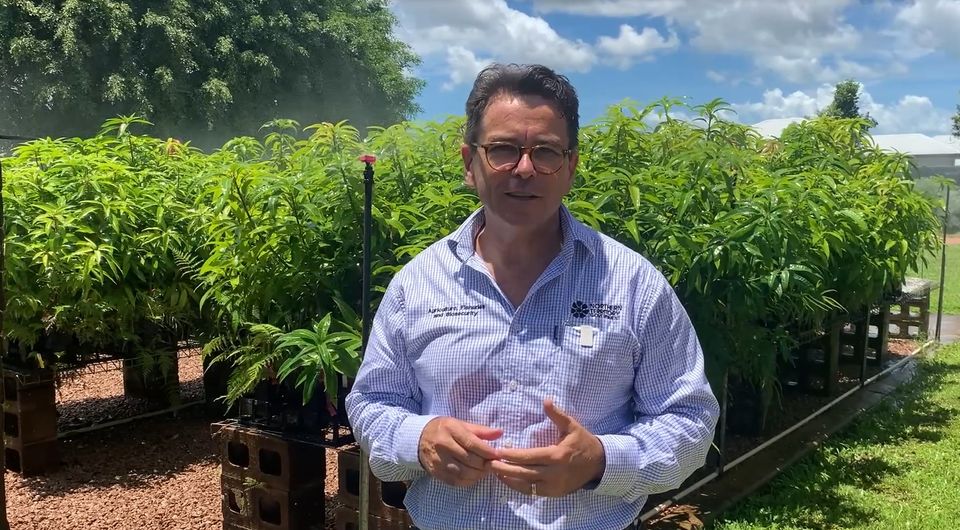
The team at Agriculture and Fisheries extends its deepest sympathies and condolences to the family of our friend, leader, colleague and mentor, Luke Bowen, who passed away last month.
Luke was a champion for the Territory, for the cattle industry and agriculture more broadly, for mining, Defence and all industries that benefit regional and remote communities.
His passion for development in regional and remote communities reflected his determination to improve living standards for Aboriginal Territorians in particular, and the bush in general.
Significantly, Luke was instrumental in leading the Northern Territory’s cattle industry through the 2011 live export ban to Indonesia.
Luke will be sadly missed, remembered fondly and celebrated perpetually.
We honour and remember him.
NT remains on alert for Avian Influenza - update from Chief Veterinary Officer, Rob Williams
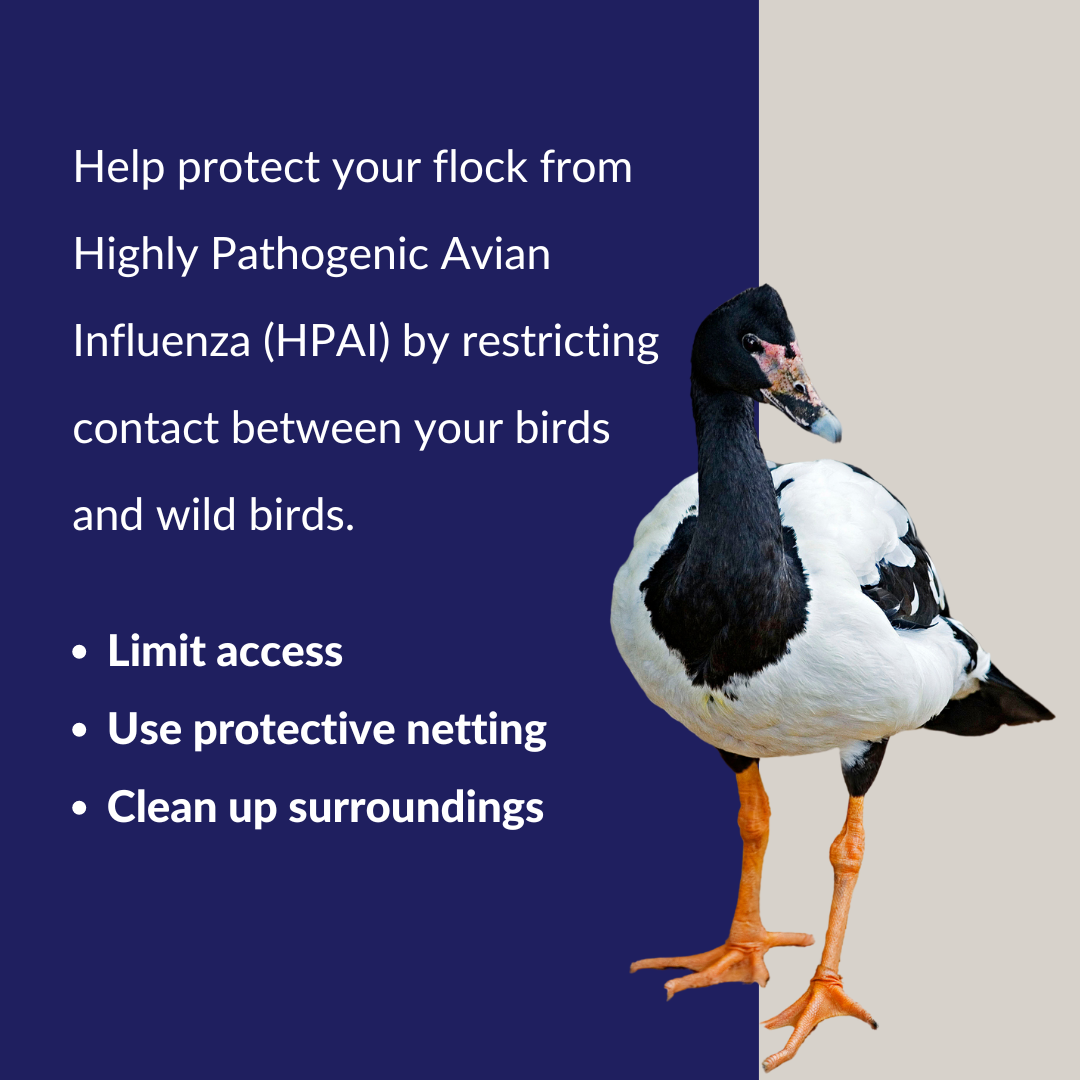
While the cases of Highly Pathogenic Avian Influenza (HPAI) appear to be contained in southern states, the Northern Territory continues to be on high alert due to the potential risk from migratory birds arriving from overseas.
Avian Influenza poses a serious threat to wild and native birds, as well as poultry like chickens, ducks, geese, and turkeys. Although we have not detected highly pathogenic strains in the NT so far, we remain vigilant for early detection.
This month, our Incident Management Team (IMT) has made available a range of downloadable resources on the NT Government website for distribution across the Territory. I encourage everyone to visit the site and share these resources with your teams and external stakeholders.
If you observe multiple sick or dead birds, please report them immediately by contacting the 24-hour Animal Disease Hotline at 1800 675 888.
Biosecurity is a shared responsibility, and we appreciate your efforts in raising awareness and sharing our resources far and wide.
Territorian Tanya Egerton shines on the national stage
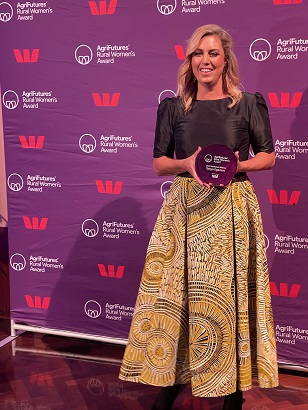
Congratulations to our very own, Tanya Egerton, the 2024 AgriFutures Rural Women’s Award National Winner. Tanya was honoured at the national awards ceremony in Canberra for her innovative work in transforming op-shops into opportunities and empowering First Nations communities to engage in the circular economy.
Tanya’s achievement highlights the crucial role women play in shaping rural industries, businesses, and communities. Australia’s regions are full of inspiring stories like Tanya’s, and we commend all the finalists for their dedication and support for local communities.
Learn more about the AgriFutures Rural Women’s Award at AgriFutures Australia.
Central Australian Rangeland Management Course
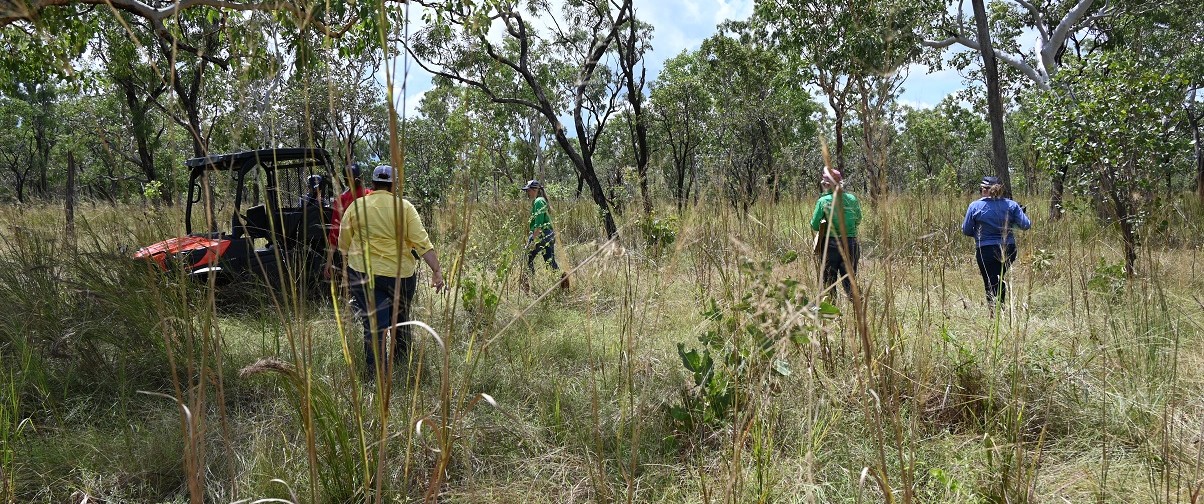
The Central Australian Rangeland Management Course is a free, one-day workshop tailored for early-career professionals in the beef cattle industry of Central Australia. Delivered directly on-station, the course offers invaluable insights into critical aspects of rangeland management, including pasture dynamics, species identification, carrying capacity, cattle nutrition, poisonous plants, weeds, and fire management.
Designed with a strong practical focus, participants get hands-on experience in arid zone ecological processes and the unique climate characteristics that influence pasture production in the region. One of the course highlights is taking participants into the paddock to identify and learn about pasture species firsthand. For many, particularly those new to Central Australia, this is their first introduction to the plants that form the foundation of the grazing enterprise.
The course also covers how to assess land capability and condition, providing essential skills for effective station management. Feedback from the inaugural course, held in early 2024, has been overwhelmingly positive:
"It’s okay to take a day away from work when the course is so interesting and directly relevant to our everyday jobs," shared staff from Lyndavale Station.
Jess from OMP Research Station added,"I wish it had been available when I was a first-year ringer. It would have changed my perspective on lots of things."
The course can be delivered on-station, offering the advantage of learning in a familiar environment. Additionally, sessions are available at the Old Man Plains Research Station, with the next workshop scheduled for Tuesday, 17th September. These sessions are open to station staff, stock agents, and industry support personnel.
For more information or to book a session, please contact Alison Kain at 8951 8101 Alison.kain@nt.gov.au.
2024 Kidman Springs Bredwell Fedwell workshop and BeefUp forum
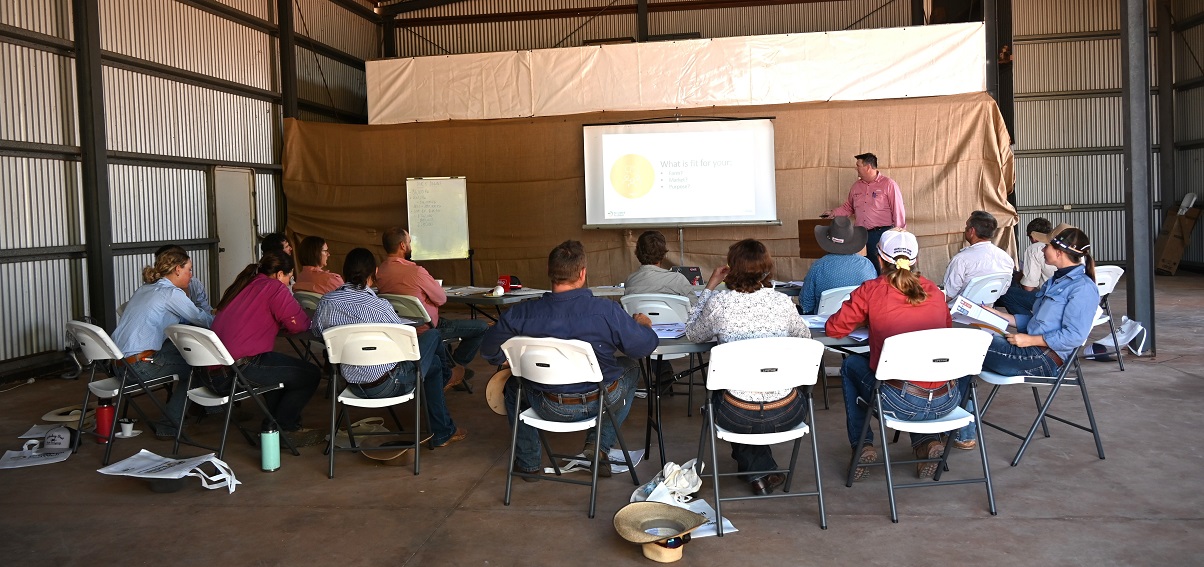
The NT Government’s Kidman Springs (Victoria River Research Station) hosted two well attended events last month which provided research updates to industry, insights from guest speakers and an opportunity to network. The Bredwell Fedwell workshop on 19 August was facilitated by Todd Donaldson from Elders Townsville and covered the fundamentals of ruminant nutrition and genetic selection of cattle using Estimated Breeding Values (EBV’s).
Following the workshop, the biannual BeefUp forum and Field day was held 20-21 August. Informative panel sessions covering cattle reproduction and genetics, improved pastures and a paddock tour were highlights of the event. The Sweet Spot project panel facilitated by Robyn Cowley also provided some great perspective on pasture utilisation and the effects this can have on breeder herd performance.
The BeefUp forum also coincided with the 30th year of the Shruburn project which was an opportunity for past and present livestock industries staff to look back on results and findings from the project.
A special thanks goes to all sponsors, presenters and attendees! Kidman Springs BeefUp was run in collaboration with MLA and supported through funding from the Future Drought Fund.
Community Science Project (July-August 2024)
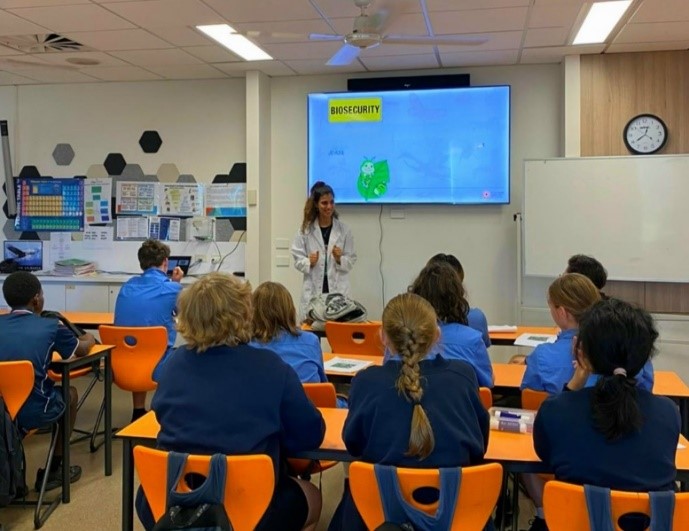
Dr Sonu Yadav and her team have been making a significant impact through their hands-on molecular workshops across schools in Maningrida, Katherine, Nganmarriyanga, and Palmerston. These workshops not only provided students with practical experience in biosecurity but also introduced them to potential STEM career pathways.
The workshops involved insect trapping with the help of students, followed by a demonstration of DNA extraction from the insects. Students were then shown how to visualise DNA using gel electrophoresis. The feedback from both students and teachers has been overwhelmingly positive, with many expressing a keen interest in participating in more science experiments in the future.
With such encouraging responses, Sonu and her team plan to continue delivering workshops in other schools across the Northern Territory, with potential expansion to the Torres Strait Islands in the coming months.
Biosecurity Symposium
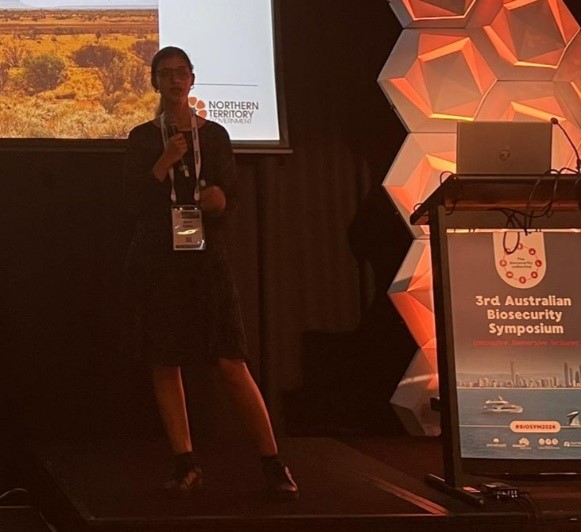
At the 3rd Australia Biosecurity Symposium, Dr Sonu Yadav represented the team by presenting their innovative work on molecular techniques and community science projects. Her presentation highlighted the pioneering efforts taking place at the Berrimah Science Precinct labs and provided valuable insights into the future of biosecurity in Australia. The symposium was a great opportunity to showcase the Northern Territory's leadership in this field.
To read more about the symposium, visit the biosecurity collective website.
Workshop: DNA Barcodes for the Top End
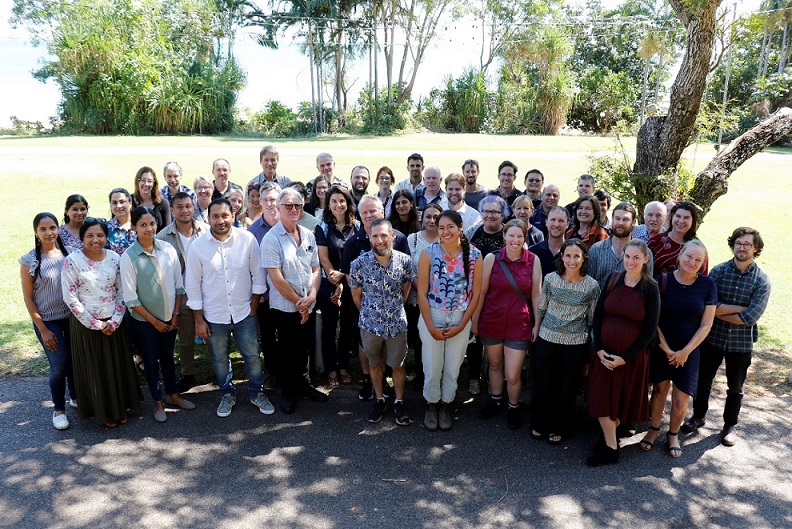
In June, the workshop "DNA Barcodes for the Top End" brought together around 50 attendees to discuss the priorities and benefits of DNA-based monitoring in the Northern Territory. The workshop aimed to identify which terrestrial and aquatic fauna are best suited for DNA barcoding and eDNA monitoring and ways to maximise the potential of these technologies.
Participants engaged in discussions on case studies, explored the DNA barcodes collected so far, and outlined future barcoding needs. The workshop also delved into the effort required to move from organism to barcode, including specimen collection, DNA extraction, sequencing, and access to funding.
The event featured a stellar line-up of local and interstate speakers from various esteemed organisations, including the Northern Territory Government, Museum and Art Gallery of the Northern Territory (MAGNT), Charles Darwin University, CSIRO, and Parks Australia. The talks covered a range of topics, from the National DNA Biodiversity Library (CSIRO) to the Atlas of Living Australia and MAGNT’s role as a vital source of reference material.
The workshop was a collaborative effort from the NT Department of Agriculture and Fisheries, Department of Climate Change, Energy, the Environment and Water, the Museum and Art Gallery NT and Charles Darwin University.
Embracing leadership and collaboration across borders
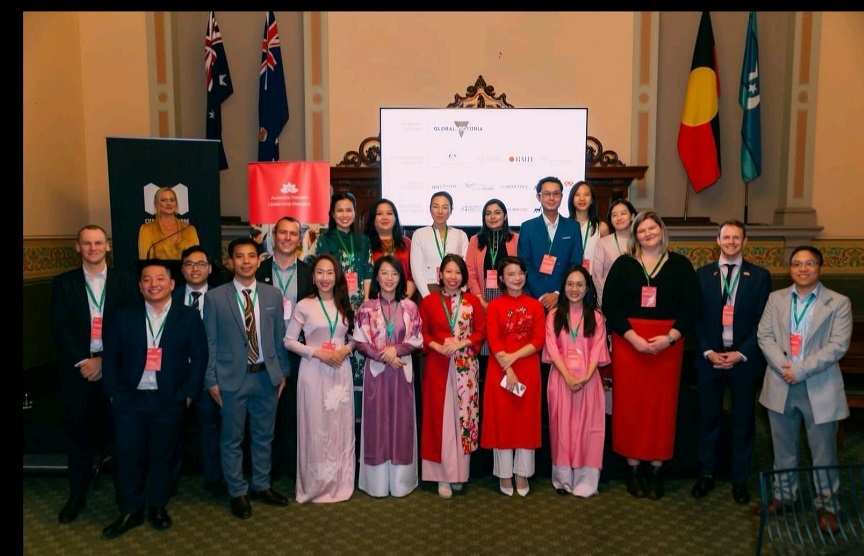
The transformative power of leadership and cross-cultural collaboration was highlighted this month during, Dakshina Yadav’s (Plant Industries Scientist) two-week journey to Victoria, for the Marcus Oldham Leadership Program (MORLP) and Australia-Vietnam Leadership Dialogue (AVLD).
The two prestigious programs provide an opportunity to explore the depths of leadership, strategic thinking, and international partnerships.
The Marcus Oldham Leadership Program was an immersive experience from start to finish, where Dakshina followed a rigorous schedule, starting with a 6am cold-water swim and ending at 8:30pm with inspiring guest speaker presentations.
Dakshina said the days were designed to push participants beyond their comfort zones, helping them cultivate vulnerability, empathy, resilience, and innovative thinking.
“The program also served as a melting pot for diverse leaders from across Australia, fostering deep and meaningful connections that will likely extend far beyond the two-week experience.”.
Immediately following MORLP, Dakshina was off to participate in ALVD fostering new connections with delegates from Vietnam and representatives from the Australian Department of Agriculture, Fisheries and Forestry.
“I am so grateful for this opportunity, this was a ground-breaking moment for the Northern Territory, as it was the first time our region was represented at AVLD, and the outcome has sparked discussions about the possibility of hosting AVLD 2026 in Darwin.”
“If realised, this would create significant opportunities for the Territory, further strengthening its global ties.”
“This two-week journey underscores the importance of leadership programs and dialogues in shaping the future of not only individuals but also regions. With newfound perspectives, connections, and potential collaborations on the horizon, this experience stands as a testament to the power of leadership development and international dialogue.”
Learn more about MORLP at Marcus Oldham College and the AVLD at Australia-Vietnam Leadership Dialogue.
National Science Week activities highlight agriculture and biosecurity
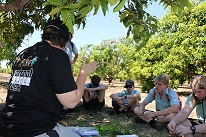
Last month, the Katherine Research Station (KRS) hosted its inaugural National Science Week event. 70 students from two Katherine high schools explored current agriculture and biosecurity programs such as Citrus Watch and Banana Freckle, learning livestock and plant industries research and how to protect the NT from biosecurity threats.
The event also highlighted career opportunities in agriculture and biosecurity, featuring hands-on activities and a special appearance by the KRS working dogs. Katherine High School Year 10 student Beau Mellor said, “The activities about solar orbits were so interesting and cool. I have never thought about science in that way.”
This exciting event was coordinated between Katherine and Darwin staff and was funded through the Commonwealth Department of Industry, Science and Resources National Science Week Grants 2024.
It was a fantastic day with our future agriculture and biosecurity champions, and we hope they went home inspired.
Read more about National Science Week at the National Science Week Australia website.
Citizen scientists in the making
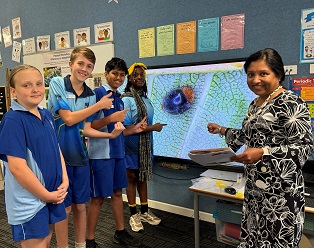
The Northern Territory Government has introduced a new biosecurity educational resource for primary school classrooms across the Territory. Developed by the Department of Industry, Tourism and Trade’s Plant Biosecurity team and adapted by the Department of Education, this resource is being delivered to Year 4, 5, and 6 students.
Students will learn about biosecurity controls and the ‘Miraculous ladybird’, Cryptolaemus, an Australian native ladybird that helps manage Papaya mealybug infestations. These ladybirds are efficient predators, consuming 30 to 70 mealybugs daily.
Through interactive activities, scientific references, and lifecycle exercises, this resource aims to inspire students and encourage future careers in science. It also seeks to educate the Territory’s future scientists, gardeners, and horticulturists on plant biosecurity and motivate them to investigate at home.
The Papaya mealybug has spread across several Darwin suburbs, affecting various trees. In response, the Plant Biosecurity team has implemented surveillance activities, including placing sticky traps, releasing Cryptolaemus ladybirds, and conducting site visits.
Be on the lookout for Tomato Brown Rugose Fruit Virus
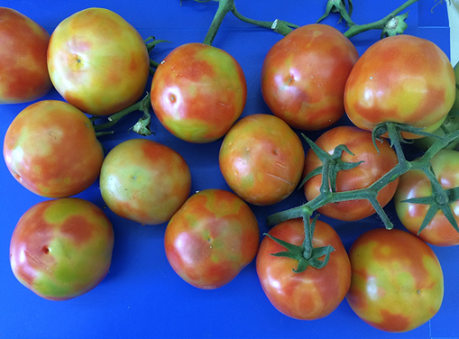
The Department of Agriculture and Fisheries’ Plant Biosecurity team are on alert for Tomato Brown Rugose Fruit Virus (ToBRFV) after it was detected at a commercial property in South Australia, prompting a state wide response and surveillance effort.
ToBRFV predominantly affects tomato, capsicum and chilli. It is a National Priority Plant Pest which poses a serious biosecurity risk to the vegetable industry in Australia. ToBRFV forms yellow spots and marbling of fruit, deformities and brown rugose patches.
The NT Plant Biosecurity team is confident that the virus has not yet reached the NT but is encouraging the public to report any suspicions of ToBRFV.
Stay alert and help us keep the Northern Territory safe from biosecurity threats. Check out the Tomato brown rugose fruit virus | Outbreak on the Australian Government for more information on what to watch out for.
Fruit Logistica
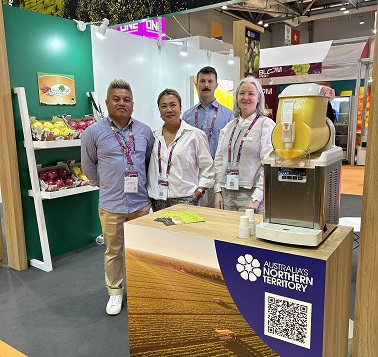
The Northern Territory was well represented at the recent Asia Fruit Logistica (AFL) event in Hong Kong 4 – 6 September 2024.
The major horticulture trade show attracted an estimated 15 000 trade visitors from more than 40 countries, and covering the entire fresh produce industry value chain and its service support companies.
The NT Government delegation made up of DITT staff Jenny Hill and Dominic Calder were also joined by Harvest Hill Orchard – one of Australia’s largest dragon fruit producers along with reps from Humpty Doo Barramundi and Kakadu Plum.
The Territory’s produce – including Humpty Doo Barramundi and Kakadu Plum was also showcased through a cooking demonstration by renowned executive chef Jaako Sorsa.
Latest innovative products and ideas in the horticulture sector were on display while attendees networked with customers from across Asia. The initiative is run as part of Austrade’s ‘Grown in Good Nature’ campaign to unify Australian businesses, industries and government agencies seeking international export opportunities.
The Territory aims to capitalise on our strategic location, major production of high-quality mangoes, dragonfruit and other tropical fruit to expand its trade partnerships in Asia.
To find out more about Fruit Logistica visit the Fruit Logistica website.
Strengthening biosecurity on the Tiwi Islands - an opportunity for collaboration
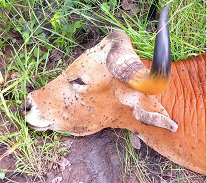
As concerns about Lumpy Skin Disease (LSD) grow, particularly along our northern and western coastlines, the Tiwi Islands have been identified as a high-risk area for potential disease entry. Recently detected in Indonesia, LSD is a viral disease affecting cattle and buffalo, transmitted by biting insects that can travel considerable distances on prevailing winds.
During the wet season, these winds carry the risk of LSD from infected regions in Indonesia towards northern Australia, making the Tiwi Islands especially vulnerable. Recognising this threat, a grant has been awarded to develop a robust biosecurity strategy for the Tiwi Islands, alongside education and awareness campaigns to bolster preparedness.
Ross Ainsworth, Regional Veterinary Officer, recently visited northern coastal communities in Arnhem Land to provide essential information to ranger groups about biosecurity measures and LSD. On the back of these visits he arranged meetings with the Tiwi Land Council and delivered information sessions with their rangers.
“The trip was focussed on how we can tailor LSD information to suit the needs of the Tiwi Islands’ biosecurity strategy”, he said.
“Together, we can work towards safeguarding the Tiwi Islands from potential biosecurity threats and ensuring the successful implementation of the Tiwi Land Council grant objectives.”
Read more on LSD in Australia on the NT Government website.
Northern Territory's agricultural future - opportunities and growth
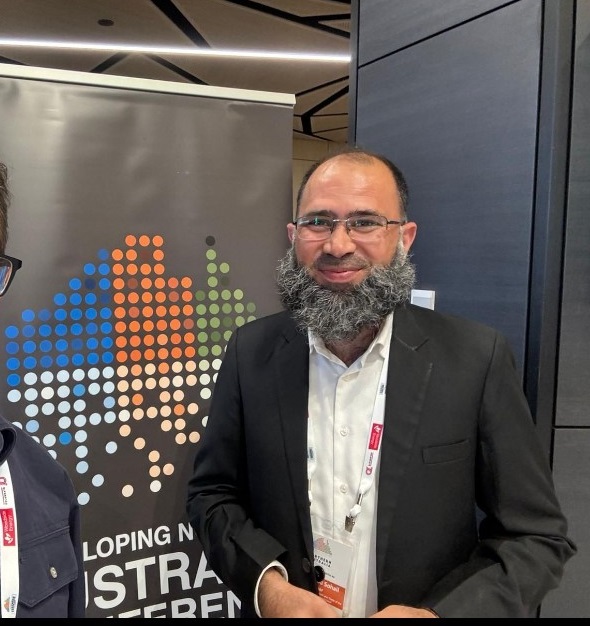
Muhammad Sohail Mazhar, an accomplished agriculture value chain professional with the Department, recently presented at the Developing Northern Australia Conference. His presentation focused on the vast opportunities for development in the Northern Territory’s agricultural sector. Alongside co-author Philip Hausler, Sohail highlighted the role of sustainable, innovative practices in positioning the Territory as a key player in Australia’s agricultural growth.
The annual conference brings together Northern Australian businesses, industry, government and communities in the same space to discuss the important issues facing the NT.
During his presentation, Sohail underscored the importance of partnerships in driving innovation and development to bolster agribusiness in the NT.
"Strengthening partnerships at local, regional, national, and international levels is key to securing external research and development funding," he said.
"These collaborations will promote the adoption of cutting-edge production systems and technologies that will propel the Northern Territory's agriculture sector forward."
The Northern Territory's forward-thinking approach to agriculture and biosecurity and the importance of driving economic development through sustainable practices and innovation was highlighted to the hundreds of delegates that attended.
For more information on Developing the North, please visit 2024 Developing Northern Australia Conference (northaust.org.au)
Upcoming Workshops and events
Get the Leading Edge on Breeding – at Breeding Edge 2024
Territory cattle producers are being encouraged to register for the next three-day Breeding EDGE workshop aimed at herd management and improving genetic outcomes. By harnessing advanced genetic and reproductive insights and technologies, participants will learn how to hit their production targets more effectively.
The workshop covers essential topics such as:
- Herd performance optimisation
- Understanding reproduction and minimising losses
- Enhancing bull fertility
- Strategies for genetic improvement
- Exploring different breeds and breeding systems
Date: 4 – 6 December 2024
Time: 8:00 am – 5:00 pm each day
Location: Katherine Research Station, Katherine
Spaces are limited, so secure your spot today! To register, contact Whitney Dollemore at 0400 649 381 or email whitney@nthbreedassist.com.
Katherine Business Dinner with Pip Courtney - Diversification in Agriculture
Join acclaimed journalist Pip Courtney will host the Katherine Business Dinner where she will deliver a keynote on the importance of diversification in agriculture.
Drawing on a deep understanding of and experience in telling agricultural stories, she will touch on how diversification can increase income, open up new markets, spread risk & build long-term resilience to climate change.
Pip will also have a fireside chat with local Territory Success Story, Simone Cameron, Cotton Australia’s Senior Policy Manager for Northern Australia. With an extensive career as an industry advocate, technical agronomist and educator, Simone’s farming journey, her love of Katherine and passion for the industry, will provide an interesting perspective on success.
Date: Wednesday 16 October 2024
Tickets : $90, includes a 2 course dinner and drink on arrival.
Book Now at obm.nt.gov.au.
Give feedback about this page.
Share this page:
URL copied!